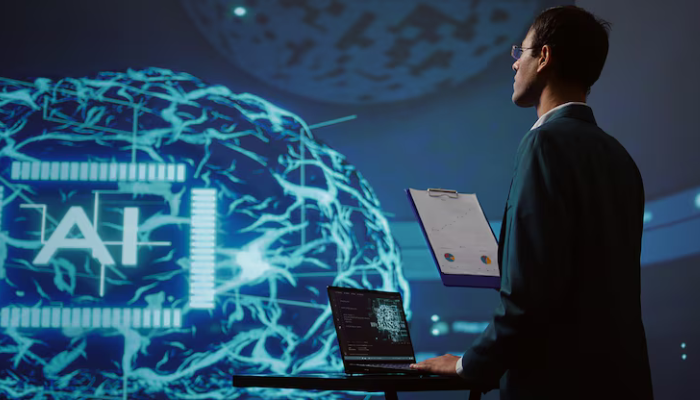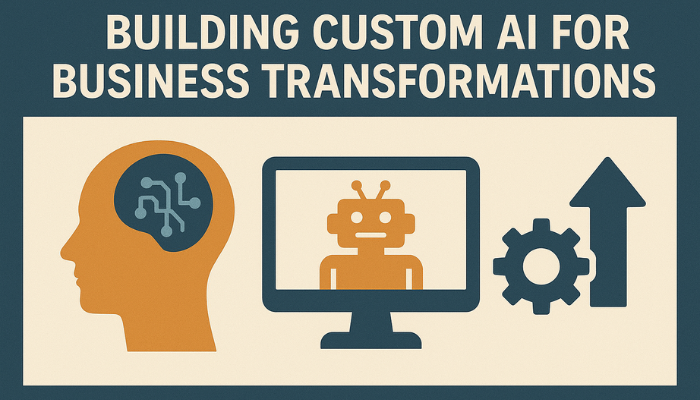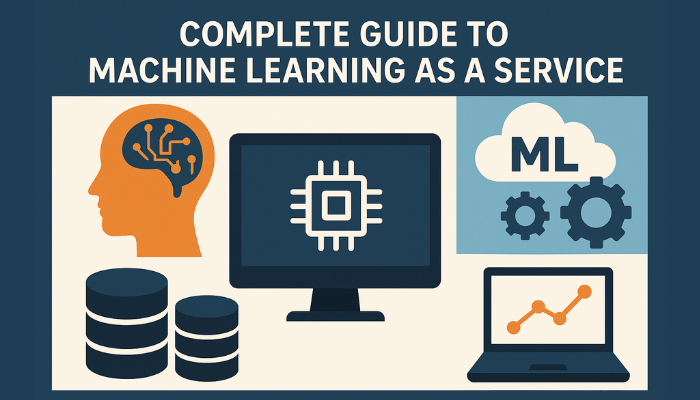If you’ve ever used ChatGPT or any AI-powered tool, you’ve probably noticed how fast AI is growing. It’s everywhere, and it’s not slowing down. The AI market is expected to grow at a staggering 35.9% annually, reaching a massive $1.8 trillion by 2030.
When it comes to software development, AI is making waves. By 2030, the generative AI market within software development is projected to skyrocket from $341 million in 2023 to $2.83 billion.
But with all this growth comes both exciting opportunities and new challenges. Businesses are excited about the potential to streamline processes, boost productivity, and create innovative solutions. But there are also hurdles to tackle, security concerns, integration challenges, and figuring out how to make it all work in the real world.
Let’s explore the ups and downs of AI in software development and how businesses can make the most of this tech revolution.
Strategic Advantages of AI in Software Development
Integrating AI into software development offers tangible benefits that can directly enhance your business operations. Here’s how AI can help you streamline processes, improve efficiency, and drive innovation:
1. Faster Development and Time-to-Market
AI can automate many of the repetitive tasks that typically slow down development, such as code generation, debugging, and testing. This means your team can focus on the more complex and creative aspects of development, resulting in faster product releases and quicker market adaptation.
By reducing time spent on routine tasks, AI helps you launch products faster, ensuring you stay ahead of competitors and meet market demands promptly. With AI, the development cycle becomes more efficient, giving you the flexibility to iterate and improve your product at a faster pace.
2. Enhanced Product Features and Personalization
AI allows you to personalize user experiences based on data-driven insights. By analyzing user behavior and preferences, AI can help you deliver features that are tailored to individual needs, making your product more engaging and valuable to your users.
This personalized approach leads to higher user satisfaction and retention rates, as your product can evolve to meet the changing needs of your audience. AI can also help optimize user interfaces, ensuring that your product is intuitive and easy to navigate, ultimately improving the overall user experience.
3. Better Decision-Making with Data Insights
One of the most valuable aspects of AI is its ability to analyze large datasets and extract meaningful insights that inform decision-making. AI can help you track software performance, monitor user feedback, and predict trends, allowing you to make more informed decisions about the future direction of your product.
By utilizing AI to analyze real-time data, you can make adjustments before problems arise, reducing risks and ensuring that your product continues to meet user needs. With AI, you can develop a more proactive approach to product development, rather than reacting to issues after they happen.
4. Improved Code Quality
AI-powered tools can automatically identify and correct issues in your code before it reaches production. By integrating AI into the development process, you ensure that bugs, security vulnerabilities, and performance bottlenecks are addressed early.
This proactive approach reduces the likelihood of errors slipping through the cracks, which can save time and resources in the long run. As a result, you can deliver a more reliable product to users, increasing trust and minimizing the need for expensive post-launch fixes. AI also helps maintain code quality over time, making your product easier to maintain and scale as your business grows.
5. Cost Efficiency and Optimized Resources
AI can help reduce operational costs by automating repetitive tasks and improving overall team efficiency. By streamlining workflows and eliminating time-consuming manual processes, you free up your team to focus on more strategic initiatives. This leads to better resource allocation, as you can maximize productivity while reducing unnecessary overhead.
Additionally, AI allows you to predict resource needs based on current trends, so you can allocate your budget and workforce more effectively. Ultimately, AI helps you do more with less, ensuring that you remain agile and cost-efficient as your business scales.
By leveraging AI in your software development processes, you not only improve productivity and enhance product quality but also gain a competitive edge in the market.
As exciting as AI’s potential is, integrating it into your software development processes comes with its own set of challenges. While the advantages are clear, navigating the obstacles that come with implementing AI is crucial for ensuring long-term success.
Also Read: Top Software Development Companies in the USA
Challenges in Artificial Intelligence Software Development
Let’s take a closer look at the main challenges you might face when adopting AI in software development and how they can be addressed.
1. Data Quality and Availability
AI thrives on data—lots of it. The more quality data AI can access, the better it can learn and make accurate predictions. However, for many businesses, the biggest hurdle is not having enough clean, structured data to train AI models. Poor-quality data leads to inaccurate results, and without sufficient data, AI models can’t perform at their best.
For software development teams, this means investing time and resources into gathering, cleaning, and structuring data to ensure the AI has what it needs to function effectively.
2. Integration with Existing Systems
Integrating AI into existing software systems can be a complex task. Legacy systems, outdated technologies, and siloed data can make it difficult to seamlessly incorporate AI tools and models. This can result in disruptions to current workflows, slowdowns in development, and additional costs.
Ensuring that AI is compatible with existing infrastructure requires thoughtful planning and skilled engineers who can bridge the gap between new AI solutions and your current systems.
3. High Development Costs and Resources
Building and implementing AI solutions can be resource-intensive. From the need for specialized talent (such as data scientists and machine learning engineers) to the computational resources required for training AI models, the upfront costs of AI development can be significant.
While AI’s long-term benefits often outweigh these costs, businesses must be prepared for the investment required to get AI up and running. Without the right strategy, these costs can quickly escalate and become a barrier to successful implementation.
4. Ethical and Bias Concerns
AI algorithms are only as good as the data they are trained on. If the data contains biases, the AI can unintentionally perpetuate them, leading to unfair or unethical outcomes. This is especially concerning in sensitive areas like hiring, lending, or healthcare.
Businesses need to be vigilant about identifying and mitigating any biases in their AI models, ensuring that the AI functions in a fair and ethical manner. Developing AI that’s transparent, unbiased, and ethical is crucial for maintaining trust with users and regulators.
5. Talent Shortage
AI development requires specialized skills, including machine learning, natural language processing, and data science. There is a significant talent shortage in the AI field, and finding developers with the expertise to build and implement AI systems can be a challenge.
This shortage of skilled professionals can lead to increased hiring costs or the need to train existing staff, further delaying your AI initiatives. Ensuring your team has the right expertise or investing in training programs is vital to overcoming this challenge.
While these challenges may seem daunting, they are not impossible. With the right strategies and approach, you can overcome these hurdles and successfully integrate AI into your software development process.
Also Read: Understanding Benefits and Challenges of AI in Cloud Computing
How to Mitigate These Challenges?
While AI integration comes with challenges, addressing them strategically can make the process smoother and more successful. Here are some actionable steps you can take to mitigate these common obstacles in AI software development:
1. Ensure High-Quality, Structured Data
AI models depend heavily on the quality of data they are trained on. Poor data leads to inaccurate results, which can undermine the effectiveness of AI in your development process. To overcome this challenge:
- Invest in data cleaning: Make sure your data is free from errors and inconsistencies.
- Use diverse datasets: Ensure your data represents a wide range of scenarios to avoid bias.
- Leverage data augmentation techniques: This helps expand your data pool by generating synthetic data to train AI models more effectively.
2. Plan for Seamless Integration
Integrating AI with existing systems can be complex, but it’s crucial for smooth adoption. Proper planning and infrastructure can prevent disruptions and costly delays:
- Assess existing infrastructure: Before integrating AI, ensure your systems can handle the new technology.
- Adopt modular solutions: Start with smaller, manageable AI implementations that can be easily integrated.
- Focus on interoperability: Choose AI solutions that work well with your current software stack and can scale as needed.
3. Manage Costs Effectively
AI development can be resource-intensive, but there are ways to keep costs manageable without sacrificing quality:
- Outsource or hire strategically: Consider contracting AI experts or collaborating with AI development agencies for specialized tasks.
- Prioritize high-impact projects: Focus on AI initiatives that deliver the most value and return on investment.
- Optimize computational resources: Use cloud-based AI tools to avoid heavy upfront infrastructure costs.
4. Address Ethical and Bias Concerns
Ethical AI is essential to maintain user trust and comply with regulations. To ensure fairness and transparency:
- Audit your data regularly: Continuously monitor and audit datasets for any biases.
- Develop transparent AI models: Make your AI systems explainable to users, ensuring that decisions can be understood.
- Promote inclusivity in development: Work with diverse teams to reduce unconscious bias in AI models.
5. Bridge the Talent Gap
AI development requires specialized skills, and the shortage of qualified talent can delay your projects. Here’s how to mitigate this challenge:
- Upskill your existing team: Provide training and resources to help your current employees gain expertise in AI technologies.
- Collaborate with AI specialists: Work with external consultants or partner with AI-focused firms to access expertise.
- Invest in AI education: Support AI education and certification programs to build a skilled workforce within your organization.
By taking these proactive steps, you can overcome the common challenges of AI software development and successfully leverage AI to improve your products and processes. With the right strategy, AI can become a powerful tool in driving your business forward.
Struggling with AI issues in software development?
Codewave helps solve problems like slow integration, poor code quality, and high costs. We use React Native, Solidity, and Machine Learning to enhance performance, reduce errors, and speed up your development process.
Contact Us for Faster, More Reliable AI Solutions
Opportunities of AI in Software Development
The integration of artificial intelligence into software development is creating unprecedented opportunities that are fundamentally transforming how we build, test, and maintain applications. Rather than replacing developers, AI is emerging as a powerful force multiplier that enhances human capabilities and opens new frontiers of possibility.
Accelerated Development Cycles
AI-powered tools are dramatically reducing the time from concept to deployment, enabling teams to iterate more frequently and respond to market demands with unprecedented agility.
Key Benefits:
- Intelligent Code Generation: Transform natural language requirements into production-ready code with security best practices and error handling built-in
- Pattern Recognition: Automatically implement common architectural patterns and boilerplate code
- Rapid Prototyping: Quickly experiment with innovative approaches without extensive manual coding
- Focus Shift: Developers can concentrate on unique business problems rather than reimplementing established solutions
Enhanced Code Quality and Reliability
AI brings consistency and thoroughness to code review that complements human expertise, resulting in more robust software with fewer post-deployment issues.
AI-Powered Quality Improvements:
- Intelligent Code Review: Identify potential bugs, security vulnerabilities, and performance issues beyond traditional rule-based checking
- Contextual Analysis: Understand code intent and context to provide more meaningful feedback
- Predictive Bug Detection: Forecast where bugs are most likely to occur based on complexity and historical patterns
- Technical Debt Reduction: Proactively identify and address code quality issues before they become problematic
Intelligent Testing and Quality Assurance
AI transforms testing from a reactive process into a proactive strategy for maintaining software quality through automated test generation and predictive analysis.
Revolutionary Testing Capabilities:
- Comprehensive Test Generation: Create test cases for edge cases, boundary conditions, and complex integration scenarios that humans might miss
- Predictive Testing: Identify which application components are most likely to break when changes are made
- Behavioral Analysis: Study user interactions and code paths to generate realistic test scenarios
- Resource Optimization: Focus testing efforts where they matter most based on risk assessment
Democratization of Software Development
AI is lowering the barriers to entry for software development, enabling professionals from diverse backgrounds to contribute meaningfully to technical projects. Natural language programming interfaces allow domain experts to express complex business logic without needing to master intricate syntax or programming paradigms.
This democratization extends beyond individual contributors to entire organizations. Small teams can now accomplish what previously required large development departments, and non-technical stakeholders can participate more directly in the development process through AI-mediated interfaces.
Personalized Development Experiences
AI is creating personalized development environments that adapt to individual coding styles, preferences, and skill levels. These intelligent systems learn from each developer’s patterns and provide contextually relevant suggestions, documentation, and learning resources.
Advanced AI assistants can serve as mentors for junior developers, offering real-time guidance on best practices, design patterns, and problem-solving approaches. This personalized support accelerates skill development and helps maintain high standards across teams with varying experience levels.
Automated Maintenance and Optimization
AI enables continuous monitoring and optimization of applications in production, creating software that becomes more robust and efficient over time without manual intervention.
Continuous Improvement Features:
- Performance Optimization: Automatically tune configurations and optimize database queries based on real-time metrics
- Security Automation: Detect and respond to threats in real-time while applying patches and updates safely
- Resource Management: Analyze system resources and user behavior to optimize application performance
- Self-Healing Systems: Automatically address common issues before they impact users
Data-Driven Decision Making
AI transforms software development from an art based on intuition to a science driven by data. Development teams can make informed decisions about architecture, technology choices, and resource allocation based on comprehensive analysis of code metrics, user behavior, and business outcomes.
Predictive analytics helps teams anticipate future requirements, plan capacity, and identify potential technical debt before it becomes problematic. This data-driven approach leads to more strategic development decisions and better alignment between technical choices and business objectives.
Innovation in User Experience
AI enables the creation of more intuitive and responsive user interfaces that adapt to individual user needs and preferences. Machine learning algorithms can analyze user behavior patterns to optimize layouts, suggest relevant features, and even predict user intent.
Voice interfaces, natural language processing, and computer vision capabilities are becoming standard components of modern applications, creating more accessible and engaging user experiences. These AI-powered features transform static applications into dynamic, intelligent systems that grow more valuable with use.
Also Read: Key AI Trends to Watch in 2025
The opportunities presented by AI in software development are growing quickly as technology advances. We’re heading toward a future where AI and human developers collaborate to create software that’s more reliable and efficient. To make the most of these opportunities, working with a strong AI software development partner is crucial to ensure your solutions meet business needs and stay ahead of the curve.
Moving Forward with Confidence
Let’s be real, implementing AI is complex, and hurdles like data quality, integration, and skill gaps will undoubtedly arise. But here’s the good news: with the right partner by your side, these challenges are nothing more than stepping stones toward success.
At Codewave, we specialize in turning these roadblocks into opportunities for growth. Our team of experienced AI experts, data scientists, and technology consultants has worked with businesses of all sizes to successfully implement AI solutions tailored to their unique needs.
Let us show you how AI software development can revolutionize your business in industries like:
- Retail & E-commerce: We’ll develop personalized product recommendation engines that boost conversion rates, automate customer support with AI-driven chatbots, and optimize inventory management to minimize stockouts and overstocking.
- Healthcare: We’ll implement predictive analytics models to forecast patient outcomes, build AI-powered medical image analysis tools, and create AI-driven diagnostic systems that support faster, more accurate decisions.
- Fintech: We’ll design fraud detection systems that learn and adapt in real time, develop AI-powered credit scoring models for better lending decisions, and deploy algorithmic trading systems that optimize financial operations.
- Education: We’ll create adaptive learning platforms that personalize student experiences, automate grading and assessment, and build AI tools to increase student engagement and retention.
Find Your Industry Solution Here
Don’t let challenges stand in your way. Whether you’re a startup exploring AI or an established enterprise scaling its capabilities, Codewave provides customized solutions to meet your unique needs.
We’re just a call away – Let’s Talk!
Codewave is a UX first design thinking & digital transformation services company, designing & engineering innovative mobile apps, cloud, & edge solutions.







